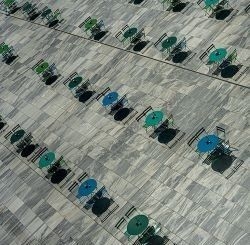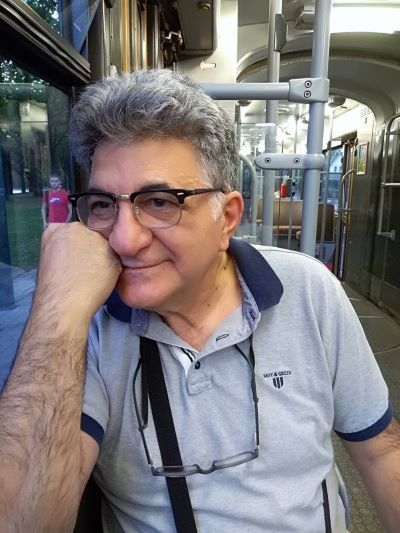The 21st issue of the magazine is born in a period in which crisis is still dominant to such an extent that it tends to become "normality" in all our lives. While the crisis of the pandemic is still present - although no longer in the foreground - the war in Ukraine, the energy crisis and the imminent threat (on various levels) of winter, shape a climate that maintains anxiety and uncertainty in all sectors. In this climate, people try to maintain some of their constants, to maintain a minimum of certainty in order to withstand the uncertainty that dominates the world around us.
We are trying to get back close again, to meet again, to pick up the threads again and to converse face to face, sometimes with joy, sometimes with awkwardness, sometimes realizing that maybe we need to say farewell to some of the threads and look for new ones and new meanings. In such a climate, the 11th Conference of the European Family Therapy Association was held in Ljubljana between September 7-10, 2022, to which a large part of the present issue of the journal is dedicated.
But before we refer in detail to the articles in the issue, we are unfortunately called to say farewell to another member of our systemic community, Child Psychiatrist and Psychotherapist Stathis Baklezos, who passed away in July, at the age of 65. Sofia Petta, who worked with him for more than ten years, says goodbye with a moving text to the man, the child psychiatrist, the colleague, the teacher, the friend Stathis Baklezos.
The following articles of the magazine contain the impressions of HESTAFTA members from the conference in Ljubljana. Nikos Marketos, Emilia Markouizou-Ghika and Katerina Theodoraki describe through an experiential text how they experienced this conference, what images they took with them and what questions arose about the "there" of the conference and about the "here" of systemic therapy and family therapy.
This is followed by Dimitris Magriplis’ speech, which was given within the framework of the conference and refers to the "consecutive crises" and their effects on the Greek family, exploring the risk factors but also the protective factors that could strengthen resilience at the individual, family and social level.
The following article also raises a number of very important questions and concerns about our role and responsibility as therapists in the current circumstances. Leaving Ljubljana, Lykourgos Karadzaferis's article takes us to Palo Alto, as it refers to the Palo Alto group, and within the context of the group that spoke about the context, posing a series of political, social and personal questions. In an excellent and comprehensive review, Lykourgos Karatzaferis, goes back to the roots of the systemic theory, connects the persons, the theory and the context with today and the -sometimes -agonizing questions that arise concerning the role of therapy and therapists.
Katia Charalampaki also returns to the deepest roots of psychotherapy and systemic therapy with her article that refers to envy in the life of the couple. Beginning with the Oresteia and moving on to Klein, Kernberg, Bateson, and Watzlawick, she highlights the timelessness of issues of envy in the couple and suggests therapeutic goals for envy to be experienced "as a human trait, which can be destructive, but also, in milder forms, it can be tolerated by both self and partner".
In the next paper, Michaela Chondrokoukis describes the story of a teenage girl in a residential care structure, her psychotherapeutic journey, but also the path of the therapist as she accompanies her client on this journey, with the lens sometimes turning to the client and sometimes to the therapist. Reaching the end of this journey, the author speaks of the "restorative and transformative power of reflective functioning and new relational experience", which allows us to "live moments of closeness that leave resonant imprints, turn shackles into bonds, create connections and meanings".
Continuing with the trauma of parental absence, Nikos Marketos refers to a dream and a letter addressed to father. The dream refers to the well-known dream mentioned by Freud in the interpretation of dreams entitled "Father can't you see I'm burning?", while the letter is a letter written by the writer Franz Kafka to his father. In his article, N. Marketos refers, as he says, "to the always lost meeting with the important person and to the question of what wakes up the dreamer. The common element of both is that they linger on the father's inability to see or hear what is crucial and fatal for his child", a question that is particularly crucial and relevant nowadays regarding both the "father-parent" but also the "father-State".
For all these questions we often resort and look for meaning in art. In the last article, Maria Panagiotidou talks about the connection and use of art in family therapy. Through a literature review, she refers to how art was introduced to family therapy and how it was subsequently utilized through specific methods and techniques, what is the relationship between art forms and specific schools of systemic therapy and finally how the use of art expands the role of the therapist and the limits of psychotherapy.
This issue closes with the presentation of the book "Psychoanalysis and Neurosciences", by Dimitris Kokkalis. As he states, this is a book with multiple levels of reading: the reference to psychoanalytic concepts, the recall of neurological data of brain function through the latest developments in neuroscience, a comparative study of elements of the aforementioned approaches and applied systems of thought, and the level of systemic thinking with a basis in "the 'holistic'-'relational' perspective". He concludes that "It is a statement of broadening our viewpoints and reconciliation with the 'Different Other'".
Enjoy reading!
On behalf of the Editorial Board
Athanasia Kati
The photos are by Periclis Antoniou


